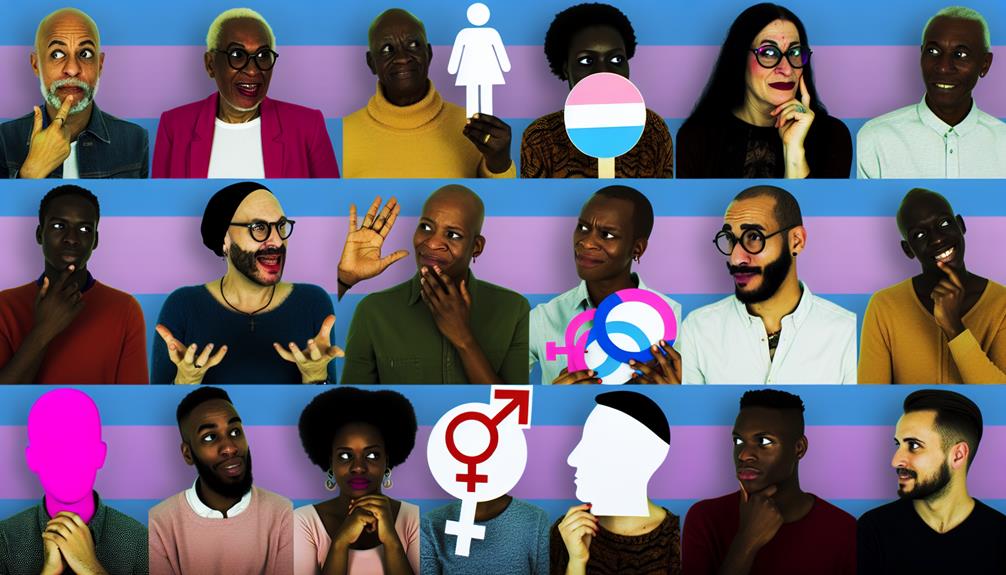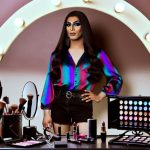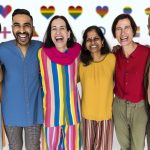Exploring Gender Diversity: Black Americans’ Views on Trans Issues


Table of Contents
ToggleYou’d think every single Black American would be on the same page about gender issues, but the reality is far more complex. While most firmly support women’s rights and appreciate the feminist movement, opinions diverge sharply regarding transgender and nonbinary topics. Why do only 31% believe that gender can differ from the sex assigned at birth? And what causes just 36% to feel that society has adequately accepted transgender individuals? This split reflects deeper layers of thought shaped by history, politics, and individual experiences. What might this mean for the future of gender equality within the community?
Research into Black Americans’ views on gender equality reveals strong support for women’s rights but a complex and divided stance on transgender and nonbinary issues.
You might be surprised to learn that 79% of Black Americans prioritize equal rights for women, and 76% believe the feminist movement has positively impacted women’s rights. That’s a clear sign of solid backing for gender equality.
But regarding transgender issues, the picture is more complicated. Imagine discussing transgender acceptance within your community. You’d find that only 31% of Black adults believe gender can differ from the sex assigned at birth. That’s a much lower acceptance rate compared to the general population.
This division becomes more evident as 36% of Black Americans feel society hasn’t gone far enough in accepting transgender people, while 29% think it’s gone too far.
How do these views affect the daily lives of Black LGBT individuals? A significant 60% have faced threats of violence, highlighting real safety concerns.
It’s clear that while gender equality and feminism have strong support, transgender issues present an ongoing challenge in achieving broader acceptance within the community.
Considering the long history of racial and gender discrimination, Black Americans’ perspectives on gender equality are deeply rooted in their unique historical experiences. For centuries, Black women have faced both racial and gender oppression. Figures like Maria Miller Stewart in 1832 and the Combahee River Collective in 1977 highlighted the intersections of race, gender, and class. These historical factors have shaped Black Americans’ strong support for gender equality today.
However, regarding transgender and nonbinary issues, perspectives are more divided. Why is this the case? One reason could be the different historical and cultural contexts surrounding gender identity. While 79% of Black Americans prioritize equal rights for women, only 36% believe society hasn’t gone far enough in accepting transgender individuals. This split is partly influenced by political ideology and religious beliefs. For example, Black liberals are generally more supportive of transgender rights compared to conservatives.
Education also plays a role. Black women tend to support feminist movements more than Black men, reflecting disparities in educational experiences. Understanding these historical factors can help us grasp why views on gender equality and transgender rights vary within the Black community.
While Black Americans have a strong history of supporting gender equality, their views on transgender and nonbinary issues show a more complicated and divided picture. Did you know only 1.4% of Black adults identify as transgender or nonbinary? Yet, 63% know someone who’s transgender, typically a friend. This familiarity hasn’t translated into broad acceptance; only 13% of Black adults feel society is accepting of transgender individuals.
Why the divide? Political ideology plays a big part. Among Black liberals, 49% think society hasn’t accepted transgender people enough. In contrast, only 26% of conservatives agree. What about you? Where do you stand?
Discrimination is a significant concern. About 60% of Black adults acknowledge that transgender individuals face considerable discrimination. Younger generations, especially those in their late teens to late twenties, are more supportive, with 70% backing transgender rights. But those over 45 tend to oppose these rights more frequently.
These numbers show a community grappling with complex issues. While many Black adults advocate for broader rights and acceptance, others are cautious or even opposed. This split reflects ongoing dialogues about identity and inclusivity, illustrating that the progression toward full acceptance is still unfolding.
Amid growing awareness, how connected do you feel to the Black and LGBTQ communities, and what does belonging mean to you? For many Black Americans, these questions are intertwined, driving a deeper exploration of identity and community. Nearly half of Black LGBT adults feel a strong sense of connection to Black communities, showing that racial identity remains a significant anchor.
Belonging can be complex, especially within diverse groups. Awareness of transgender issues is increasing, with 63% of Black adults knowing someone who’s transgender, often through friends. However, feelings of inclusion vary:
These statistics highlight the nuances within the community and the different experiences of Black transgender individuals. For some, awareness and community support are vital in feeling a sense of belonging.
Reflect on your own experiences—how do you navigate these intersections of identity? Engaging with these questions helps foster a more inclusive and supportive environment for everyone.
Many Black Americans are deeply concerned about the nation’s progress on gender equality and the safety of LGBTQ individuals. Around 69% of Black adults believe the U.S. hasn’t achieved gender equality for women yet. This highlights a strong commitment to gender equity within the community.
However, in regard to transgender acceptance, opinions are more divided. Only 36% of Black adults think society hasn’t gone far enough in accepting transgender people. Political views play a big role here. For instance, 49% of Black liberals feel that transgender individuals haven’t been accepted enough, compared to just 26% of conservatives. This split shows how varied perspectives can be within the community.
Safety is a major concern too. Nearly 60% of Black LGBTQ individuals report facing threats of violence, underscoring the challenges they face daily. Do you think these numbers reflect your own experiences or those of people you know?
Awareness is growing, though. About 63% of Black adults know someone who’s transgender. These personal connections often help shape more accepting views. How can we build on this growing awareness to foster greater acceptance and equality for everyone?
You’ve got to take into account historical context when understanding Black Americans’ views on gender equality.
Think about the long fight against racial and gender discrimination.
Cultural factors like community values, religious beliefs, and the legacy of civil rights movements shape these views.
How do these cultural elements influence your own perspective on gender?
It’s essential to ask these questions to grasp the multifaceted nature of these opinions.
Think of religious beliefs like the roots of a tree, grounding many opinions. If you’re raised in a religious community, you might find its teachings shape your views on transgender and nonbinary issues.
For example, some religious texts don’t recognize gender beyond male and female. Do you think these traditional beliefs influence acceptance?
How do you balance faith with evolving understandings of gender identity?
To foster inclusivity within Black communities, start by promoting open dialogues and education about gender diversity.
Support local events that celebrate all identities and create safe spaces for discussions.
Encourage leaders to advocate for inclusivity.
Have you considered mentoring programs that pair individuals from diverse backgrounds?
Celebrating shared values while respecting differences can strengthen community bonds and promote understanding.
What steps will you take to make a difference?
Oh, media representation is just flawless, right? It’s not like it stereotypes or excludes people.
Imagine seeing more transgender and nonbinary folks in movies or shows. Wouldn’t it change minds and hearts?
When you see diverse characters, you start to understand their stories. Don’t you think that kind of visibility makes a difference?
It’s time for the media to step up and truly reflect society’s diversity.
Yes, there are notable generational differences in views on gender identity within Black families.
Younger generations tend to be more accepting and supportive of transgender and nonbinary identities.
Have you noticed how older family members may hold more traditional views?
These differences can lead to significant conversations about identity and understanding.
How can you bridge this generational gap in your own family?
Engaging openly might help.
In the end, it’s no coincidence that Black Americans strongly support gender equality while being divided on transgender issues.
These views reflect a complex history and diverse experiences.
So, where do you stand? Think about how historical oppression shapes beliefs today.
Can we bridge these divides and welcome all identities? By understanding each other better, we can hope for a more inclusive future.
Let’s start conversations and create change together.
 Featured PostsNovember 5, 2025Changing Bodies, Changing Desires: Sex Identity in Transition
Featured PostsNovember 5, 2025Changing Bodies, Changing Desires: Sex Identity in Transition Featured PostsNovember 4, 2025Passing Tips Every Trans Girl Should Know
Featured PostsNovember 4, 2025Passing Tips Every Trans Girl Should Know Featured PostsNovember 4, 2025Trans 101: The Facts Everyone Should Know
Featured PostsNovember 4, 2025Trans 101: The Facts Everyone Should Know Featured PostsNovember 4, 2025Beyond the Basics: An In-Depth Preparation Roadmap for Your Facial Feminization Surgery Consultation
Featured PostsNovember 4, 2025Beyond the Basics: An In-Depth Preparation Roadmap for Your Facial Feminization Surgery Consultation